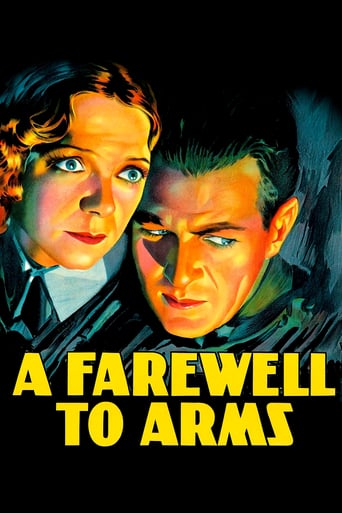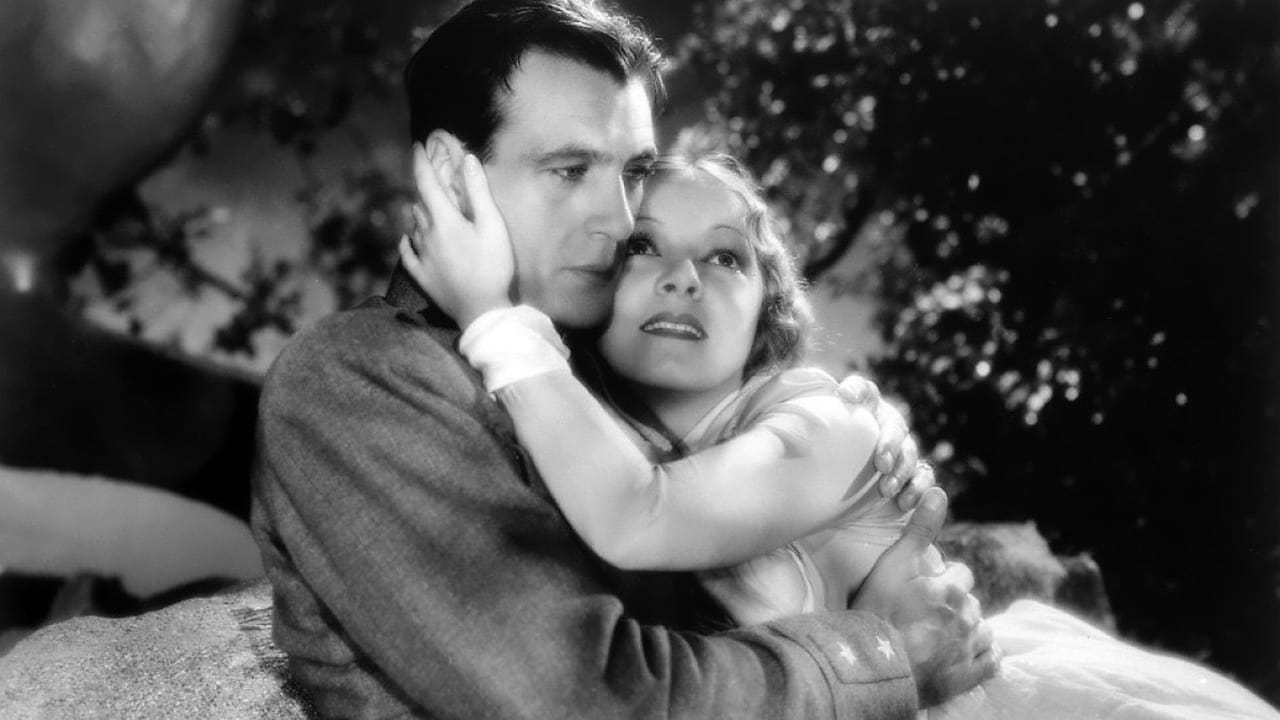SnoopyStyle
American Frederic Henry (Gary Cooper) is serving as an ambulance driver on the Italian front during WWI. He is taken with English nurse Catherine Barkley (Helen Hayes). His best friend Italian doctor Major Rinaldi is also taken with her. Her fiancée had died at the Sommes. Frederic and Catherine begin a romance in the midst of war.Gary Cooper and Helen Hayes are doing their romantic best. This adaptation of the Ernest Hemingway classic is skewed more towards romanticism. As for the epic retreat, the movie tries to capture it but only as sound stage special effects and montages. Same goes for the crossing. The action adventure intensity isn't there. While the actors are superior, the adaptation lacks tension. This version takes the first crack at the book and hits a solid single.
jamesghughes
This movie is exactly why my darling wife watches the end of a picture before investing her valuable time and emotions into a film. No wonder it didn't win Best Picture in 1932. I guess some folks found Hemingway's typical pessimism artistic, but I didn't. I found it to be sadistic and without the redeeming quality of genuine love, albeit born of human nature and sexual desire in a time of cruel adversity. The only thing more cruel than the war are the main characters, save the priest. They are cruel and not worthy of being called, "friends." If Hemingway had friends like them, it's no wonder he committed suicide with a shotgun. If you liked the way this ended, you'll love Forrest Gump and another Hemingway classic downer, For Whom the Bell Tolls. It's a shame this story is mandatory reading in some schools and a literary study in some circles of academia.
romanorum1
The opening narrative: "Disaster as well as victory is written for every nation on the record of the World War, but high on the rolls of glory two names are inscribed – the Marne and the Piave." Of course, the Marne refers to the Western front, and the Piave refers to the Italian, wherein lies this movie's focus. "A Farewell to Arms" is based upon the semi-autobiographical novel of Ernest Hemingway's experiences when he served as an ambulance driver for the Italians who fought the Austrians and Hungarians in World War I. In the opening sequence we see a dead soldier draped with the Alpine background. Then we observe several Italian ambulances moving along the winding mountains away from the battlefield. Our hero Lt. ("Tenente" in Italian) Frederic Henry (Gary Cooper) casually reports to Headquarters just as young and attractive English nurse Molly is being rebuked and dismissed for getting pregnant. She had fallen in love with a soldier; "Disgracing the uniform we all wear," proclaims the head nurse. Regulations are regulations.Lt. Henry is good friends with Major Rinaldi (Adolphe Menjou), who is also a surgeon. The two men drink and visit brothels together. Rinaldi happens to like English Nurse Catherine Barkley (Helen Hayes), but early on, after she is introduced to Henry, she and the young lieutenant are greatly attracted to each other. They become lovers right away and just before Henry has to return to the front. Meanwhile Rinaldi uses his influence to have Barkley transferred to Milan. Just before the shelling begins on the battlefront, we see the Italian soldiers eating their rations of bread, cheese, and pasta . . . and even wine. While the men are eating an Austrian shell scores a direct hit, wounding Henry in the right knee and foot. Henry is removed to the military hospital in Milan where Barkley is stationed. Their love affair resumes, but because the Italian Chaplain (Jack La Rue) knows that they are not married, he conducts a proxy marriage (not in the book, however). Later the hospital head nurse, after catching Henry with his hidden liquor bottles under the mattress, reports him to authorities who deem him healthy enough to revisit the front. While Henry is thus away, Rinaldi, who has censorship authority, censures the letters of both Barkley and Henry because he feels that it is wrong for the lieutenant to "lose his head over a woman." The soldier and the nurse lose contact.Meanwhile a great Austrian and German offensive has succeeded in breaking through the Italian defensive line at Caporetto (October 1917), and the Italians are in retreat. They are constantly blasted with bombs and raked with aerial machine gun fire. Displeased with the Italian high command (perhaps not without reason), Frederic Henry deserts the army. His main goal is to link up with Catherine somehow. He meets up with Catherine's best friend, Nurse Helen Ferguson (Mary Philips) and is genuinely surprised when she unenthusiastically tells him that Catherine is pregnant. But Frederic still does not know where she is located. And the Italian police (carabinieri) are still searching for him. Events are fast-forwarded because a newspaper headline reads, "Italian Armies Successful in Great Piave Offensive." (This event occurred in June 1918.)Eventually Henry meets up with Major Rinaldi, who relents and shows compassion when Henry tells him that Catherine is with child. He gives Henry Catherine's location (Brissago, Switzerland) and cash to help him. Time is fast-forwarded to November 1918, as a newspaper headline now reads, "L'Austria Capitola" ("Austria Capitulates"). Now the scene inter-cuts with Catherine's most difficult childbirth event in the Swiss hospital. Her baby boy is stillborn, and her health is failing. Soaked with rain Frederic arrives in the hospital in time to share some words with Catherine. Their last moments are tender ones. He lifts her dead body as doves fly and the church bells ring, proclaiming that the Armistice has ended the Great War. "Peace," Frederic utters.Hemingway's novel actually ends during the middle of 1918, at the height of the great German offensives on the Western front. And in the novel Frederic Henry dejectedly leaves the Swiss hospital and walks out into the rain. All in all, the movie is a very successful tearjerker, and is better than the 1957 version, although the latter's cinematography is at a high level, and even though Cooper is over a foot taller than the diminutive Hayes. Director Frank Borzage, who began filming in 1913, was the first person in Hollywood history to win the Academy Award for Best Picture (Seventh Heaven, 1929). He won again in 1931 for "Bad Girl." Borzage's version of "A Farewell to Arms" belongs among the top 15 or 20 movies of 1932 even though his adaptation is loose. His well-known trademark was in identifying the feelings of young lovers in the face of intense trial, as in wartime. His montages here, like the retreat from Caporetto and Henry's twenty mile-trek to Switzerland through storms, are both expertly done. Charles Lang won the Academy Award for Cinematography. The acting is fine all the way around although Hayes sometimes overacts. Both Adolphe Menjou and Jack La Rue, who have French surnames, do very well acting as Italians. Menjou as Rinaldi is the worldly one; La Rue as the priest prays for the end of suffering and war's end. Gary Cooper was destined to win the Academy Award for Best Actor twice: Sergeant York (1940) and High Noon (1952).(PS: I also reviewed the 1957 version of "A Farewell to Arms" for IMDb on 2 April 2014.)
Space_Mafune
Gary Cooper stars as Lieutenant Frederic Henry, an American ambulance driver serving in the Italian army during World War I. There he meets and falls in love with a nurse named Catherine Barkley (Helen Hayes) but the war looms heavy over the couple's chances for happiness.While this movie feels a bit dated and the war scenes go on too long and seem to be too darkly lit, this is epic romance that ultimately proves hard to take one's eyes off. You root for the characters and want to overcome the odds despite all that stands in their way making the final reality of what ultimately happens all the more potent. A real tear-jerker for the soft hearted this one. Great romance! Let's love tonight for we may not have tomorrow...the harsh reality of war.


 AD
AD



